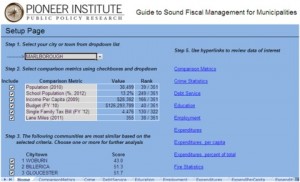New Municipal Guide Provides Tools for Local Budgeting
New Municipal Guide Provides Tools to Analyze Local Budgets, Make them More Efficient
Companion utility will allow local finance officials to develop short- and long-term financial plans
Download the Excel-based Utility Now: Municipal Guide Utility
BOSTON, MA – To help cities and towns across Massachusetts that face the challenge of state and local budget cuts, skyrocketing health care and benefits liabilities, and an anemic economic recovery, Pioneer Institute has published the Guide to Sound Fiscal Management for Municipalities. (Read in Scribd view, below)
 This handbook is intended as a resource for citizens, especially those serving on municipal finance committees, to analyze the effectiveness and efficiency of their community’s spending. Pioneer Institute has distributed over 3,000 copies to city and town finance committee members throughout Massachusetts. They are available in limited quantities to the general public upon request.
This handbook is intended as a resource for citizens, especially those serving on municipal finance committees, to analyze the effectiveness and efficiency of their community’s spending. Pioneer Institute has distributed over 3,000 copies to city and town finance committee members throughout Massachusetts. They are available in limited quantities to the general public upon request.
“Local officials make tough calls on spending every day. Given built-in costs and continuing difficulties with the economy, that’s not going to change anytime soon” said Pioneer Executive Director Jim Stergios. “This guide provides them a roadmap to smart budgeting, with efficient and cost-effective approaches to resource management and public service delivery.”
The Guide to Sound Fiscal Management for Municipalities features contributions from municipal managers and consultants including Worcester Budget Director Jarrett Conner, Brookline Deputy Town Administrator Sean Cronin, Stephanie Hirsch, an associate at UMass Boston’s Collins Center, Pioneer Senior Fellow and waste management executive Steve Lisauskas, City of Boston Project Manager and Devon Lyons-Quirk.
“It’s been well acknowledged for years that data driven performance analysis is a desirable goal for local governments,” says Chelsea City Manager Jay Ash, who authored the Guide’s Foreword. “Unfortunately, municipal managers just haven’t the time to thoughtfully assemble data and then figure out a template for reporting it. That is, until now, and this guide is that resource.”
Pioneer is releasing The Guide to Sound Fiscal Management for Municipalities with a companion utility produced by freelance developer Norman Sheppard that enables users to compare up to 15 Massachusetts cities and towns with similar characteristics across a variety of categories using available data on schools, public safety, and other municipal services, local revenues, and property taxes, debt service, unemployment rates, and other information.
The information is presented in a user-friendly format using tables and charts to facilitate in-depth analysis. Local finance committee members can use these tools to develop short- and longer-term finance plans that are sustainable and provide quantifiable levels of quality services.
“I’m excited about opening up the Excel-based utility that is a companion to the Guide to start looking in one place for all the data that small and even mid-size municipal governments don’t have the resources to assemble,” says Ash. “That utility alone should give me and many more like me the ammunition to search for areas beyond the norms and rightly position us for more informed questioning about priorities and performance.”
The Guide to Sound Fiscal Management for Municipalities provides in-depth coverage of the following topics:
Budget basics: Describes how to engage the public in the budget process, the elements of a solid budget, including its use as communication and accountability tool, and the fundamentals of quantitative and qualitative budget analysis, including setting priorities based on spending levels, benchmarking against comparable municipalities, and prior year spending;
Data Resources: Outlines sources of high-quality comparative data on education, crime and public safety, employment and workforce, land usage, and other information. Includes a companion utility that can be downloaded to access publicly available data on municipal finances, property taxes, state aid, revenues and expenditures, and other topics, so users can measure a community’s operations;
Departmental and cross-departmental analysis: Identifies numerous, specific questions and metrics analysts should consider in reviewing the major categories of expenditure in local budgets: education, public safety, debt service, public works, general government, health and welfare, planning, economic development, and building inspections; cross-departmental analysis of salaries and contractual benefits, health care and pensions “I only wish I had this Guide and Excel tool at my finger tips when I served on the Framingham Finance Committee,” says Mary Connaughton, Director of Administration and Finance at Pioneer.
“Both will prove invaluable for volunteer committee members and will enhance their diligent efforts and expedite the benchmarking process.”
“This Guide is another prominent example of the Pioneer Institute’s work to improve government in Massachusetts and beyond,” says Steve Lisauskas, contributing author. “It will be a resource to help thousands improve their cities and towns, expanding the reach of results-focused government in the United States.”
The Guide to Sound Fiscal Management for Municipalities is the latest contribution in Pioneer’s longstanding effort to assist Massachusetts cities and towns struggling to manage tight budgets and deliver high-quality core services. Since 2007, the Institute has produced 14 reports related to municipal management of finances, education, public safety and economic development programs.
Our most recent publication was A Practitioner’s Guide to Outsourcing, a survey of 22 Massachusetts cities and towns focusing on the services that they contract out to businesses, regional governments or non-profits for cost savings and efficiency. Starting in 2008, Pioneer began utilizing online tools to assist local citizens and managers in advancing needed innovations. That year, the Institute established MassCityStats.org, which allows users to compare the performance of urban communities using data on crime prevention, education, fiscal management, and other topics. In 2009, Pioneer established the Regionalization Clearinghouse, which provides access to contracts associated with successful compacts and regionalization efforts. In 2011, the Institute added MuniShare.org to its portfolio of online transparency tools. MuniShare is a clearinghouse for best practices reports authored by municipal leaders on a wide range of local issues.
###
Pioneer Institute is an independent, non-partisan, privately funded research organization that seeks to improve the quality of life in Massachusetts through civic discourse and intellectually rigorous, data-driven public policy solutions based on free market principles, individual liberty and responsibility, and the ideal of effective, limited and accountable government.




